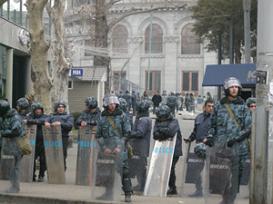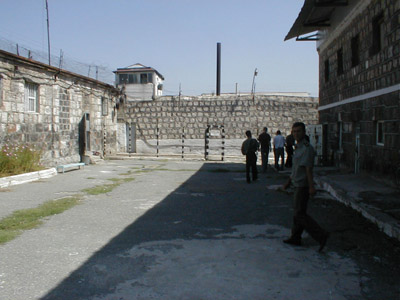CSI, NHC and FIDH have developed a joint briefing on the current state of administration of justice in Armenia, highlighting six core concerns. The briefing also outlines a row of recommendations the EU should pass on to the Armenian government during the upcoming human rights dialogue on 18 December. The organisations see this as a golden opportunity for the recent Nobel Peace Prize laureate to raise this important issue with the Armenian authorities.
At the moment, Armenia is preparing for a new round of Presidential elections on 18 February 2013. However, there has as yet not been an acceptable investigation into the events that followed the 2008 Presidential elections, which led to 10 deaths on 1 March 2008. None of the relatives have received any reparation, and the circumstances surrounding the excessive use of force by the police remain unclear.

Though most of the over 100 people arrested after the 1 March 2008 unrest were released during an amnesty in 2009, and the rest have been released over the last couple of years, there is still concern that politically motivated arrests occur in Armenia. An example described in the briefing paper regards four young Armenian National Congress activists who were sentenced to several years in prison following a confrontation between the activists and police.
Similarly, torture remains widespread, in particular on police stations all over the country. There is no efficient investigation into allegations of torture, and impunity prevails. Adding to this, the tasks of the Prosecutor’s office include supervision, approval and defence during criminal proceedings, resulting in a clear conflict of interest that gives no impetus to act on such allegations. Finally, as outlined by the UN Committee against Torture in May this year, the definition of torture in the Armenian Criminal Code has still not been brought into compliance with the UN Convention against Torture. Looking at the powers vested in the President and the Ministry of Justice, and the clear prosecutorial bias by the judges, the Armenian judiciary cannot be called independent. Similarly, the Armenian judiciary lacks specialists qualified to deal with juvenile delinquents. Neither are juveniles provided with any particular protection from the custodial measures frequently in use. Finally, the system of early conditional release lacks the necessary specialists and transparency.
Background
NHC has been concerned with the state of administration of justice in Armenia since our first involvement in the country, and has over several years been supporting three NGOs that address this issue from various angles. The organisations focus on the relationship between the police and the population, the judiciary, conditions in closed institutions, torture and ill-treatment and court monitoring.
In addition to the current briefing paper and other reports on various aspects of the administration of justice in Armenia, the Civil Society Institute also runs a website that highlights core human rights issues in Armenia (www.hra.am)
The Armenian Helsinki Association (www.hahr.am) publishes an annual detailed report on human rights in Armenia, including the situation in closed institutions and court monitoring.
The Helsinki Citizen’s Assembly Vanadzor (www.hcav.am/en) looks at reforms in the police system and the relationship between the population and the police.
